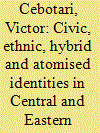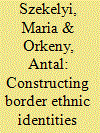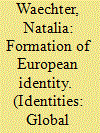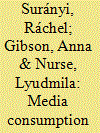|
|
|
Sort Order |
|
|
|
Items / Page
|
|
|
|
|
|
|
| Srl | Item |
| 1 |
ID:
147659


|
|
|
|
|
| Summary/Abstract |
While the topic of identity of ethnic minorities abounds in theoretical insights, most discussion is still clustered around the civic–ethnic divide while assuming conclusions with limited empirical evidence. By contrast, this article uses a four-category typology of identity that considers both in-group and out-group attachments to address hypotheses about competing identities and about factors influencing minorities to adopt one identity type over others. Based on unique data evidence of 12 ethnic minorities in Central and Eastern Europe, this study concludes that the ‘hybrid’ identity, rather than the literature-assumed ‘ethnic’ identity, tops the identification preference of minorities, although there are differences in levels and patterns when controlling for various covariates. The choice of identity depends on the socialisation process, the economic status, the perceived discrimination and intergroup tensions, reflecting variations in the system of values common to a region with complex ethnic dynamics.
|
|
|
|
|
|
|
|
|
|
|
|
|
|
|
|
| 2 |
ID:
147660


|
|
|
|
|
| Summary/Abstract |
The analysis is based on an empirical sociological study (interplay of European, National and Regional Identities: nations between states along the new eastern borders of the European Union Project) aimed at exploring the various aspects of people’s diaspora affiliations and their ethnic and national identity on the Eastern borderland of Europe. We surveyed ethnic minority groups in eight countries along the frontier of Central Eastern Europe. With the ethnic minorities having a similar ethnic status along the border, we demonstrated how ethnic minorities ‘deal’ with their minority status in their ‘host’ country. The analysis reconstructs the image of the ethnic minority at the societal level. We model personal and collective ethnic identities as a stock of knowledge based on cognitive and affective components, and test them along the different ethnic dyads. The paper shows how successive generations are able to transfer the pattern of ethnic identity within the family, and also how language use practices and personal networks play a role in preserving personal ethnic identity.
|
|
|
|
|
|
|
|
|
|
|
|
|
|
|
|
| 3 |
ID:
147661


|
|
|
|
|
| Summary/Abstract |
Research into European identity has mostly focused on majority populations in Western European countries, neglecting new member states in Central and Eastern Europe (CEE) as well as ethnic minority groups. This paper contributes to filling this gap by exploring and investigating processes of European identity formation of five ethnic minority groups in four CEE countries. A generational perspective was applied by conducting qualitative in-depth interviews with three generations of ethnic minority group members. The results support the instrumental approach of identity construction. In all minority groups researched, the young generation, due to more positive personal experiences and perceived benefits from the European Union, have developed more positive images and perceptions of Europe and a greater sense of European identity than older generations. Furthermore, ethnic group-specific processes of identity formation were found.
|
|
|
|
|
|
|
|
|
|
|
|
|
|
|
|
| 4 |
ID:
147663


|
|
|
|
|
| Summary/Abstract |
Based upon the data from qualitative studies of eight national minorities between the Baltic and the Danube, this article investigates the formation of European identification among members of the minority groups representing ‘split nations’ along the new eastern borders of the enlarged EU. The analysis reveals mechanisms of the formation of supranational identification by focusing on the relationships between subnational, national and European identifications to ascertain the degree of interconnectedness of these identification levels. These relationships are examined in the context of the potential impact of perceived ethnic conflict and utilitarian expectations of socio-economic and cultural gains from the process of European integration.
|
|
|
|
|
|
|
|
|
|
|
|
|
|
|
|
| 5 |
ID:
147658


|
|
|
|
|
| Summary/Abstract |
This special issue challenges the concept of fluidity and flexibility of identities by demonstrating that ‘new’ European identity is not easily adopted and that the co-existence of ethnic and national identities is an ongoing process of negotiation. The theoretical approach assuming multiple identities can be confirmed for ethnic minorities in Central and Eastern Europe who were often thought to be focused on ethnic identities. This issue provides empirical quantitative and qualitative evidence for showing that ethnic minorities typically relate to their ethnic identity and to the national identity of their residence country simultaneously. The individual papers reveal that the development and maintenance of ethnic, national and European identities are often linked to the socio-economic situation and possible benefits. Also, social and cultural practices such as language and media consumption are crucial for the construction of identities. Furthermore, articles in the special issue highlight that national and European politics, above all minority rights and integration policies, may contribute to ethnic and European identification.
|
|
|
|
|
|
|
|
|
|
|
|
|
|
|
|
| 6 |
ID:
147662


|
|
|
|
|
| Summary/Abstract |
The media impact on the process of ethnic identification, particularly with regard to how ethnic minority individuals reflect upon their ethnic origin, is the focus of this article. We analyse the relationships media consumption has with the identity-reflection process using biographical narratives of individuals from two ethnic minority communities in Eastern European countries: Slovaks in Hungary and Hungarians in Slovakia, focusing on how media consumption channels ethnic self-identification of minority individuals in terms of their affinity with their country of origin, their country of residence, and with Europe as a whole. Ethnic minorities in these two countries have been intensely affected by political changes of the twentieth and twenty-first centuries. We include analysis of some quantitative data and biographical narratives of ethnic minority individuals from the ENRI-EAST project, with close analysis of six biographical cases.
|
|
|
|
|
|
|
|
|
|
|
|
|
|
|
|
|
|
|
|
|